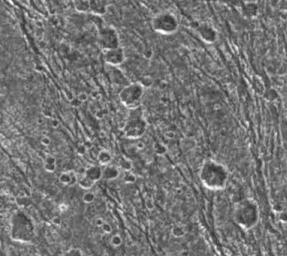
|
Secondary Craters on Ganymede
- Click the image above for a larger view
- Full-Res JPEG (382 x 341) (28.4 kB)
- Full-Res TIFF (382 x 341) (135.5 kB)
Caption:
Two large, ancient impact craters, known as palimpsests, have modified this area of dark terrain on Jupiter's moon Ganymede. In lower resolution images from the Voyager mission in 1979, it was observed that the diffuse edge of a large, circular bright feature cut through this area. This image was obtained by the Solid State Imaging (CCD) system aboard NASA's Galileo spacecraft, on September 6, 1996, at a higher resolution of 190 meters (623 feet) per picture element (pixel). North is to the top. The diffuse margin of this palimpsest is noticeable only as a gradual increase in the area covered by bright hummocks toward the western edge of the image. A more recent palimpsest-forming impact to the south has peppered this area with chains and clusters of secondary craters ranging from 5.7 to 1.2 kilometers (3.5 to 0.7 miles) in diameter. The image covers an area of 73 by 65 kilometers (45 by 40 miles).
Background Info:
The Jet Propulsion Laboratory, Pasadena, CA manages the Galileo mission for NASA's Office of Space Science, Washington, DC. JPL is an operating division of California Institute of Technology (Caltech).
This image and other images and data received from Galileo are posted on the World Wide Web, on the Galileo mission home page at URL http://galileo.jpl.nasa.gov. Background information and educational context for the images can be found at http://www.jpl.nasa.gov/galileo/sepo .
Cataloging Keywords:
| Name | Value | Additional Values |
|---|---|---|
| Target | Ganymede | |
| System | Jupiter | |
| Target Type | Satellite | |
| Mission | Galileo | Voyager |
| Instrument Host | Galileo Orbiter | |
| Host Type | Orbiter | Flyby Spacecraft |
| Instrument | Solid-State Imaging (SSI) | |
| Detector | ||
| Extra Keywords | Crater, Grayscale, Impact | |
| Acquisition Date | ||
| Release Date | 1997-11-18 | |
| Date in Caption | 1996-09-06 | |
| Image Credit | NASA/JPL/Brown University | |
| Source | photojournal.jpl.nasa.gov/catalog/PIA01061 | |
| Identifier | PIA01061 | |
